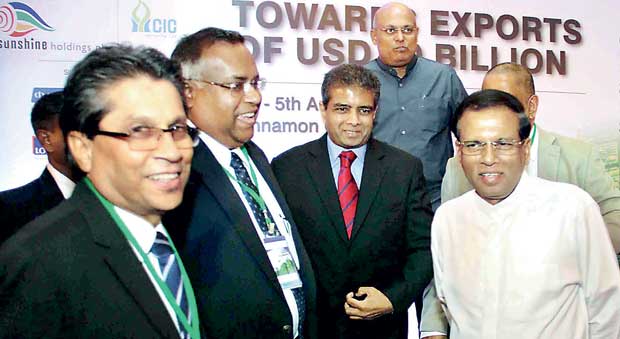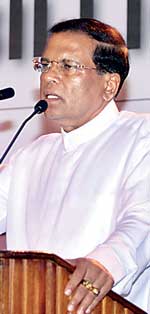Reply To:
Name - Reply Comment

President Maithripala Sirisena, who delivered a comprehensive policy-focused speech on the final day of Economic Summit 2015 organised by the Ceylon Chamber of Commerce, sharing a lighter moment with key Sri Lankan corporate figures
Pic by Pradeep Dilrukshana
By Chandeepa Wettasinghe
President Maithripala Sirisena in an impressive policy-centred address to Sri Lanka Economic Summit 2015 yesterday stressed that policy stability was more important than political stability.
“In our country, when a government or a minister in charge changes, national policies and internal processes change to suit their personal beliefs,” President Sirisena noted.

He pointed out that in neighbouring countries such as India or China national policies don’t change with changes in government, which ensures policy stability.
“So, as a government, we need stable policies and processes even more than political stability in order to continuously develop the country,” President Sirisena said.
He added that such policies and processes should be created and actively protected.
Policy inconsistency has always been a major obstacle for Sri Lanka in attracting quality foreign investments.
Policy consistency results in predictability, a key aspect any investor looks for, before making a business commitment.
The current regime has promised that national policies will be created once they are given a mandate next month.
However, whether they will be followed by a successive government will depend on the results that are achieved in the next five years.
Sirisena said in the backdrop of such policies, the public and private sectors—including small and medium enterprises—should form an interwoven bond based on trust and transparency.
“Achieving the US $ 50 billion export figure can’t be done alone. Both sectors must be ready.
On the one hand, we’re improving the public sector and its productivity, while the private sector too should improve theirs.
You both must educate the public about the benefits of exports as well,” he said.
He emphasized that both public and private sectors should have similar levels of productivity as well as discipline and ethics to become an export-driven economy.
“There are some problems with the quality of our exports. We should tend to that as well,” he added.
President Sirisena said that more bilateral and multilateral trade agreements should be signed to increase exports based on a foreign policy that is balanced towards all countries.
“Most our finished garment exports go to the West and the US is our biggest export market. We have managed to rebuild a positive relationship with them. We must consider everyone equally, whether it is China, the US, India, the EU, the UN, SAARC, ADB or the World Bank,” he said.
He also seemed to support the notion of greater imports and foreign direct investments would lead to greater exports, advocated by Professor Razeen Sally and Prime Minister Ranil Wickremesinghe.
“We need new technology in our industries and we need to move away from the traditional methods. We have to improve our education and move towards a knowledge-based market economy,” he said. Meanwhile, President Sirisena noted that the benefits of investments should trickle down to all citizens equally and questioned whether investments are done with geographic and business prudence.
He stressed that a good governance government will guarantee freedom of doing business.
Sri Lanka currently is in the 99th place in the Ease of Doing Business Index, much lower than the Southeast Asian countries Sri Lanka aspires to become or competes with.
“We, as a state, have a greater responsibility in the development process. We will ensure that businessmen are free to do their business. Politicians shouldn’t conduct business or put their fingers in it,” he said.
Sirisena also pointed out that Sri Lanka has made no use of the maritime advantage the country is blessed with.
“If you compare with all the countries that harness the ocean, Sri Lanka’s level is zero. The ocean can be used to significantly strengthen our economy. We have our fisheries, maritime tourism and other resources, which should be utilized. I urge both local and foreign investors to look at improving our maritime industry,” he said.